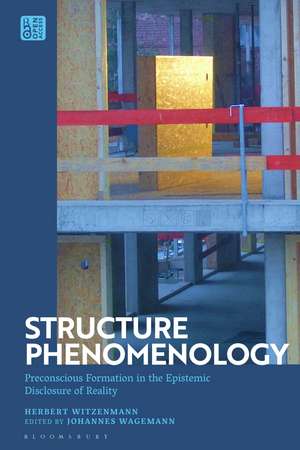Structure Phenomenology: Preconscious Formation in the Epistemic Disclosure of Reality
Autor Herbert Witzenmann Editat de Professor Johannes Wagemannen Limba Engleză Paperback – 20 mar 2024
| Toate formatele și edițiile | Preț | Express |
|---|---|---|
| Paperback (1) | 188.82 lei 6-8 săpt. | |
| Bloomsbury Publishing – 20 mar 2024 | 188.82 lei 6-8 săpt. | |
| Hardback (1) | 536.87 lei 6-8 săpt. | +111.46 lei 5-11 zile |
| Bloomsbury Publishing – 21 sep 2022 | 536.87 lei 6-8 săpt. | +111.46 lei 5-11 zile |
Preț: 188.82 lei
Preț vechi: 248.01 lei
-24% Nou
Puncte Express: 283
Preț estimativ în valută:
36.14€ • 39.27$ • 30.38£
36.14€ • 39.27$ • 30.38£
Carte tipărită la comandă
Livrare economică 21 aprilie-05 mai
Preluare comenzi: 021 569.72.76
Specificații
ISBN-13: 9781350270473
ISBN-10: 1350270474
Pagini: 176
Dimensiuni: 138 x 216 x 25 mm
Greutate: 0.21 kg
Editura: Bloomsbury Publishing
Colecția Bloomsbury Academic
Locul publicării:London, United Kingdom
ISBN-10: 1350270474
Pagini: 176
Dimensiuni: 138 x 216 x 25 mm
Greutate: 0.21 kg
Editura: Bloomsbury Publishing
Colecția Bloomsbury Academic
Locul publicării:London, United Kingdom
Caracteristici
Combining epistemology, phenomenology and cognition, this will be of relevance to a range of scholars, spanning both continental and analytic philosophy, and also psychology and cognitive sciences
Notă biografică
Herbert Witzenmann (1905-1988) was a German philosopher, known for his work on phenomenology, consciousness, and anthroposophy. His major influences include Rudolf Steiner, Goethe, and Husserl. Johannes Wagemann is Professor of Consciousness Studies at Alanus University, Mannheim, Germany.
Cuprins
Foreword, Johannes Wagemann (Alanus University, Germany) Introduction to Structure Phenomenology, Johannes Wagemann (Alanus University, Germany) 1. Biographical Notes on Herbert Witzenmann2. The Role of Introspection3. Intentionality and the Basic Structure4. The Deposited Memorative Layer5. Reality Access and Ontological Stratification6. Reception and Further Development of Witzenmann's Structure Phenomenology Structure Phenomenology, Herbert WitzenmannForewordIntroduction Part 1: The Basic Structure1.1 Mistaken Conceptions Of The Relation Between Consciousness And Object 1.2 The Basic Structure In The Light Of Rudolf Steiner's Epistemology 1.3 Explanatory RemarksPart 2: The Crucial Difficulty. The Problem of Generation2.1 Self-giving. Temporalization. Depresentification2.2. A Seemingly Resultant Infinite Regress2.3 The Problem of Continuity Part 3: The Proposed Solution3.1 Thinking Act and Thought Content (Evidence) 3.2 Further Elucidation on this Approach to a Solution 3.3 Formation of Reality and Beings 3.4 The Sub-temporal and Super-temporal 3.5 Thinking Act and Self-consciousness (the "I"). The Concept of Observation 3.6 The Solution to the Problem of Memory 3.7 The Deposited Memorative Layer. The Concept of Objectivity. The Gaze Behind the Veil 3.8 The Concept of Presence 3.9 Structural and Functional Remembering 3.10 The Paradox of Self-giving. The Self-forgetfulness of Supposing 3.11 Results of the Structure-phenomenological Exploration of the Contents of ConsciousnessPart 4: The Significance Of Structure PhenomenologyAdvice for the Reader References
Recenzii
This book is a wide-ranging analysis and synthesis of how the principles and first-person methods of structural phenomenology cast light on conceptual and non-conceptual content of experience and enable insights into the constitution of intentional content and the formation of reality. It is a highly welcome addition and foundation for the growing interest in epistemological and phenomenological issues concerning the constitution of subjectivity and the world among scientists and laymen alike.
